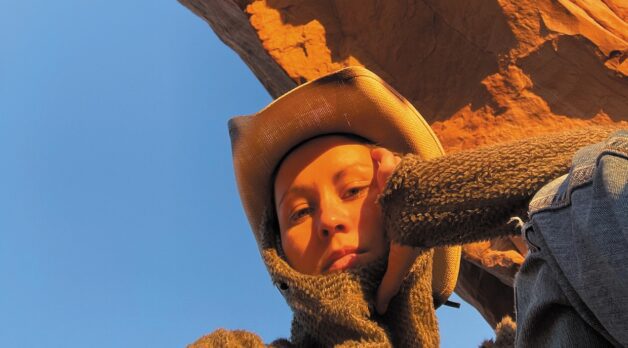Ali Vanderkruyk
 Ali Vanderkruyk
Ali Vanderkruyk

Beginning with an epigraph from Moby Dick, Ali Vanderkruyk’s experimental short Six Knots takes its title from the nautical speed that (per the guidance of Hawai’i’s Department of Land and Natural Resources) shouldn’t be exceeded within 400 yards of a whale. “Using a metaphor like Moby Dick to ground the project was helpful,” Vanderkruyk says, “not only because it represents an obsession with something you can never reach, but it also is palatable because most people are familiar with the narrative even if you haven’t read the book. By starting with Moby Dick, the audience can understand that it’s about something giant and mysterious that we don’t know but are trying to understand.”
Six Knots, accordingly, approaches its subject from a thematically appropriate, often literal or chronological distance using an invigorating variety of sources: archival shots from early government films of whale corpses being chopped apart; verité footage of present-day scientists lugging whale cadavers around; MRI and LIDAR scans they make of the whales in an effort to better understand what exactly in the environment is killing them. Of the latter, Vanderkruyk notes that “those are failed images. They pick up so much of the detritus that’s around the animal, and it’s also quite pixelated because these scans are being made on an iPhone. So, the effort is there, but there’s also a futility, which I think is an interesting conversation around conservation.”
Vanderkruyk grew up in North Vancouver and initially thought that she might be a journalist. While completing an undergrad degree in Montreal, she considered being “a speculative science fiction theater writer” like Kim Stanley Robinson. “Then, I moved to Toronto and was working at a free newspaper that doesn’t exist anymore,” she recalls. “I saw a random job ad for an artist-run film processing lab in Toronto. I had no real proclivity for shooting on film at that time, but there was something about the description of this job where I thought, ‘That is exactly what I need to do,’ because it seemed dirty and physical and that I’d be working with my hands—like a mechanic, but in the film world. I had worked in kitchens previously and really liked working in chaotic environments and with teams. So, I applied and ended up working there for five years.”
At Niagara Custom Lab, “It was me and three other guys who dedicated their life to working in this dark, chemical-filled space, and I learned how to process, print and scan super 8-, 16- and 35mm motion picture film.” Her co-workers lent Vanderkruyk cameras and gave her expired film stock, which she used to start shooting music videos for friends. Wanting to study film further, she applied to CalArts—in part because of her admiration for the work of the late Allan Sekula, a longtime faculty member there. During her course of study, she became interested in documentary ethics: “I started school thinking that I would be more interested in developing my technical skills and cinematography or becoming a more well-rounded filmmaker, but I ended up becoming much more obsessed with theory, editing and sound.”
Now having graduated and still based in L.A., Vanderkruyk is a multihyphenate with a penchant for collaboration who reels off a list of her occupations: “music video director, educator, experimental documentary filmmaker, lab technician, projectionist.” Six Knots made its premiere at the Mimesis Documentary Festival in August, launching a project that brought about an unexpected form of closure: “Until about two weeks before I finished this project, I had never seen a live whale. I grew up on the West Coast and was constantly looking for them; my family would always say that there was one, and I just missed it. So, this also represents this mystery that I’ve never been able to reach—but then finally, I did.”—Vadim Rizov/Image: Ali Vanderkruyk
